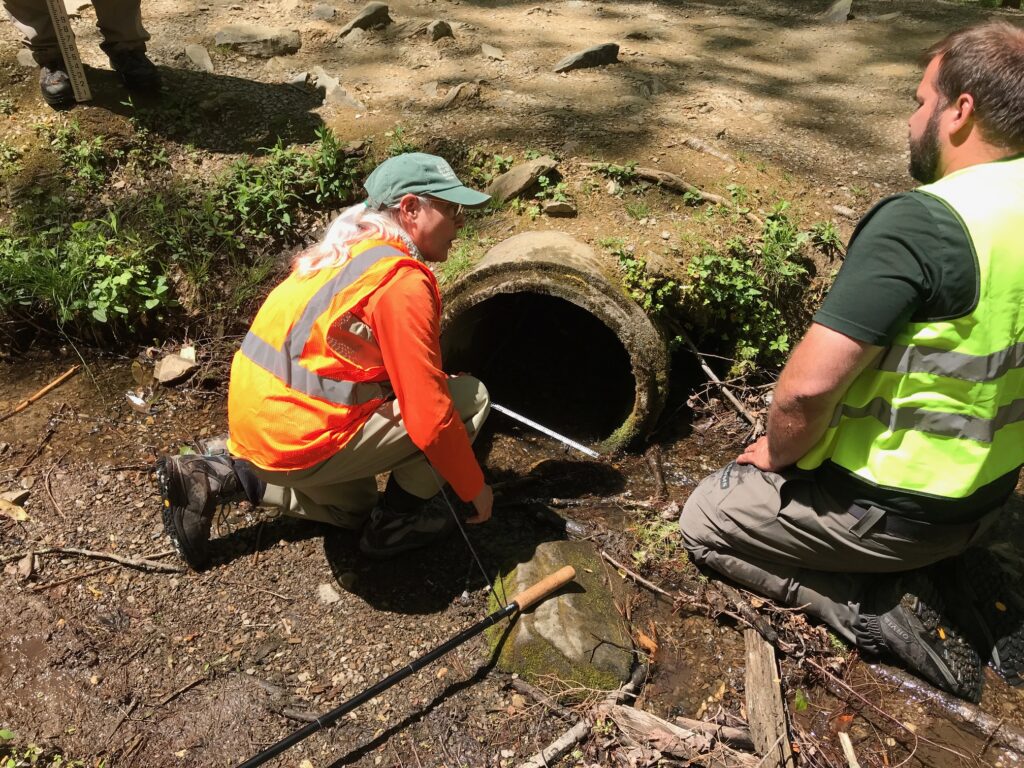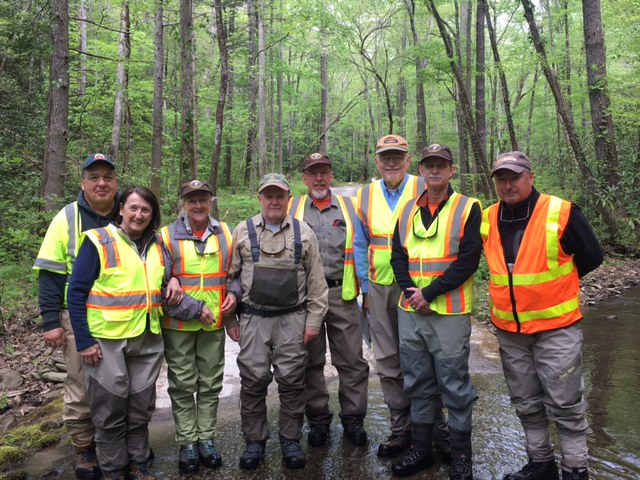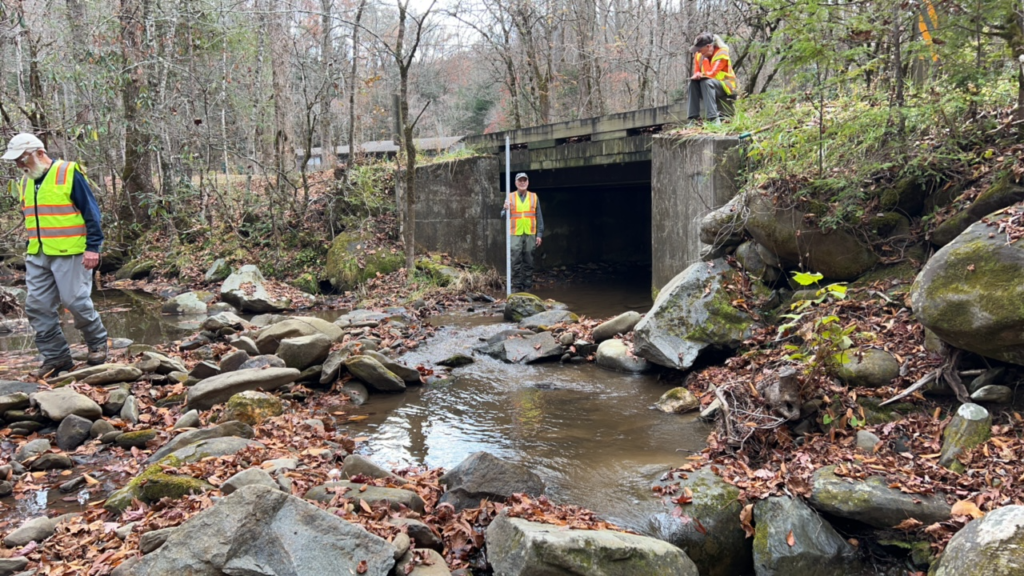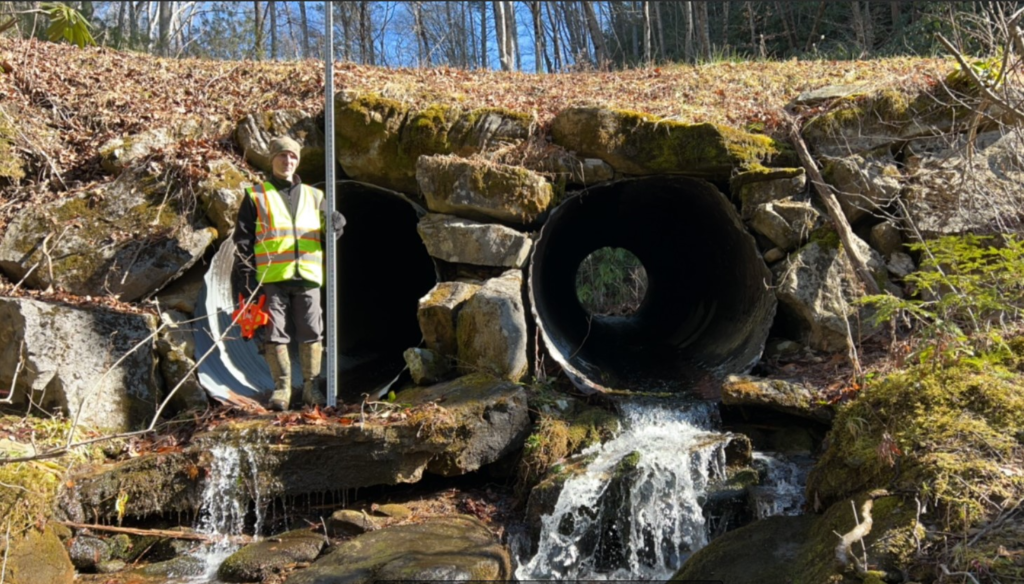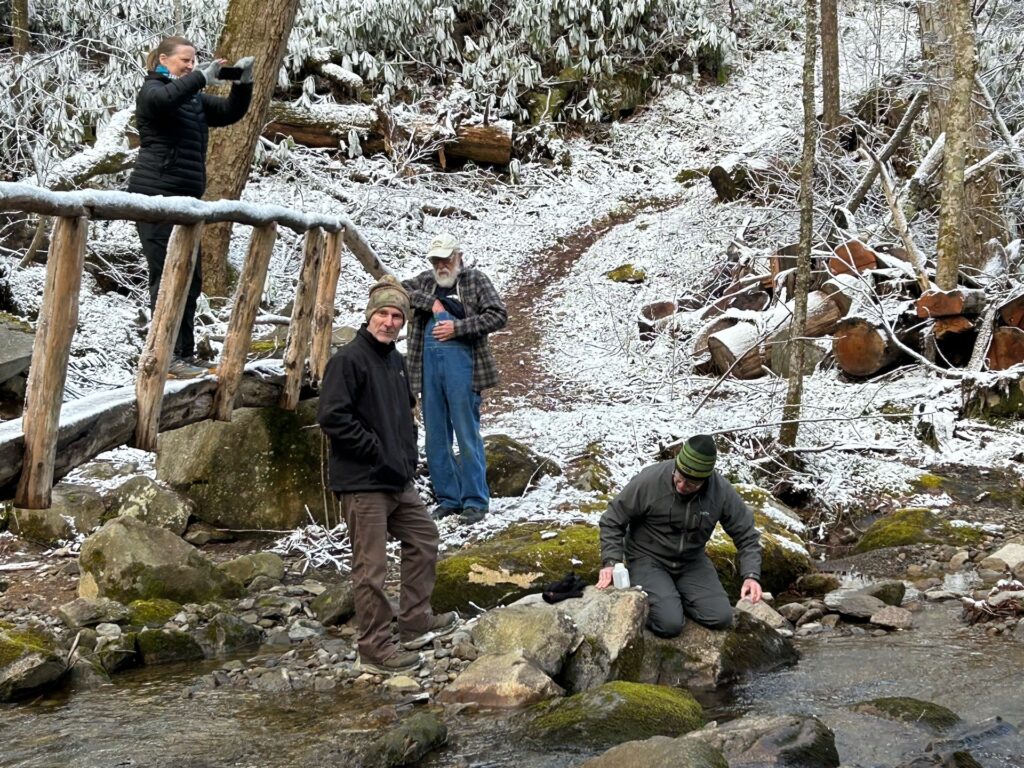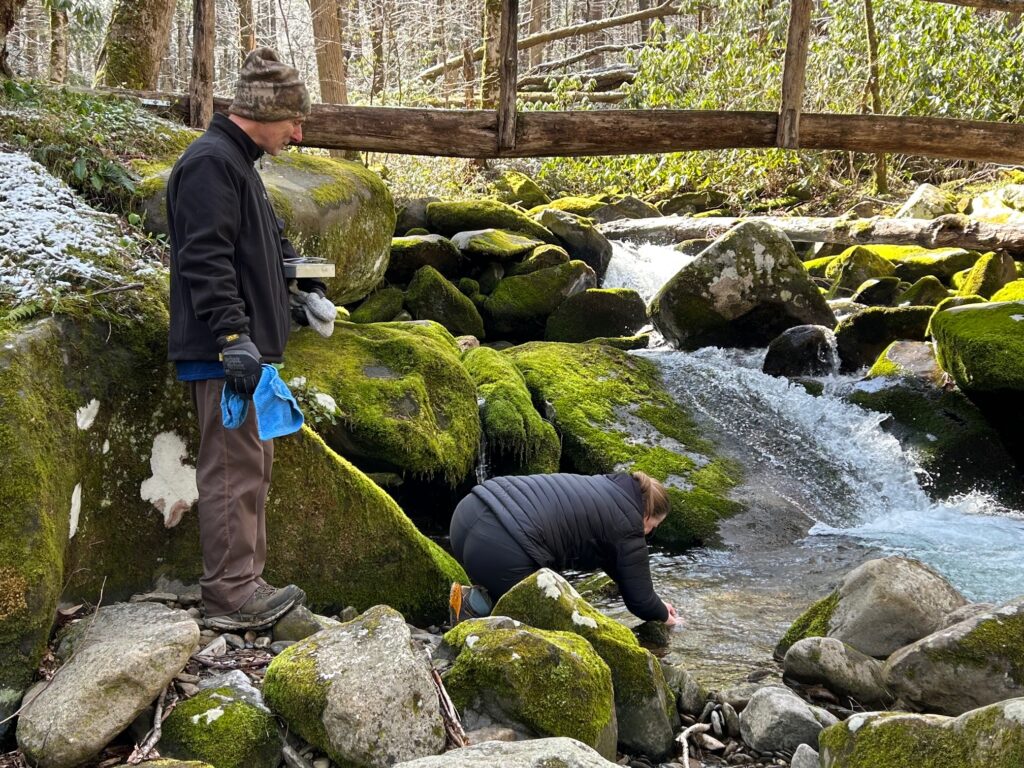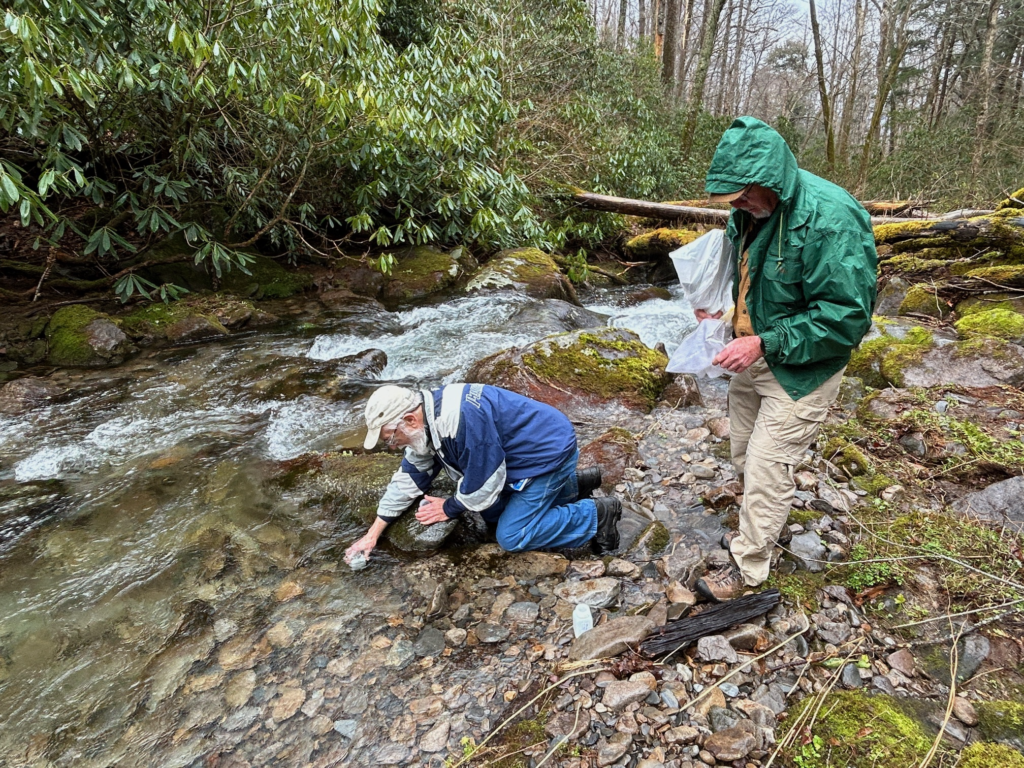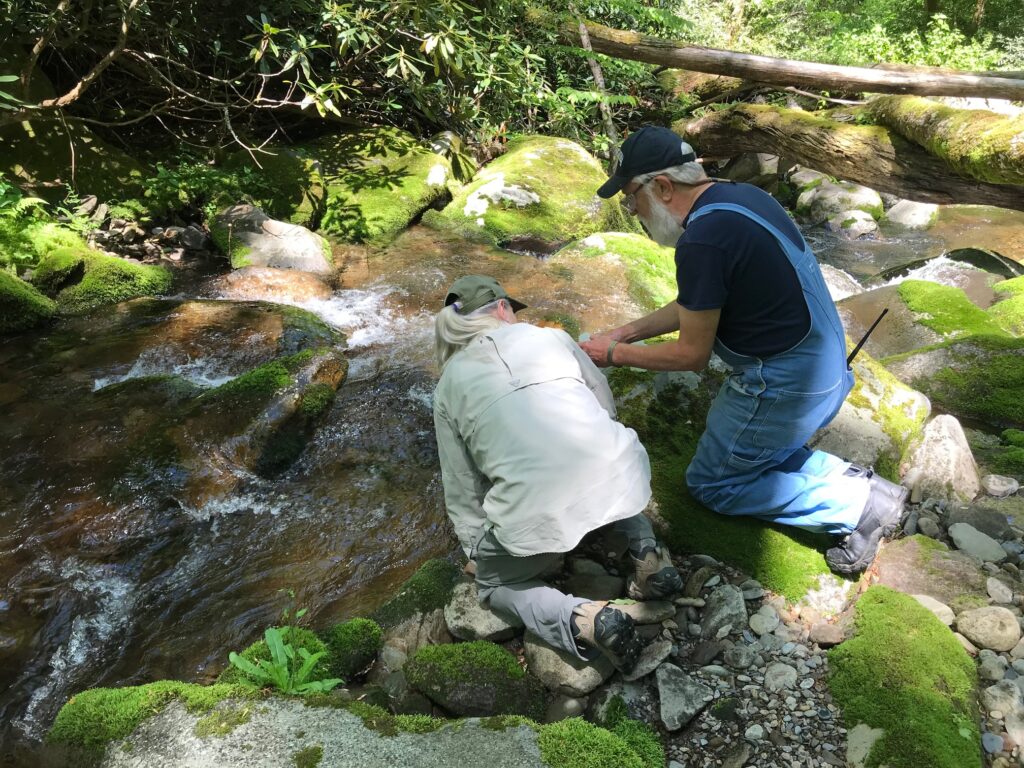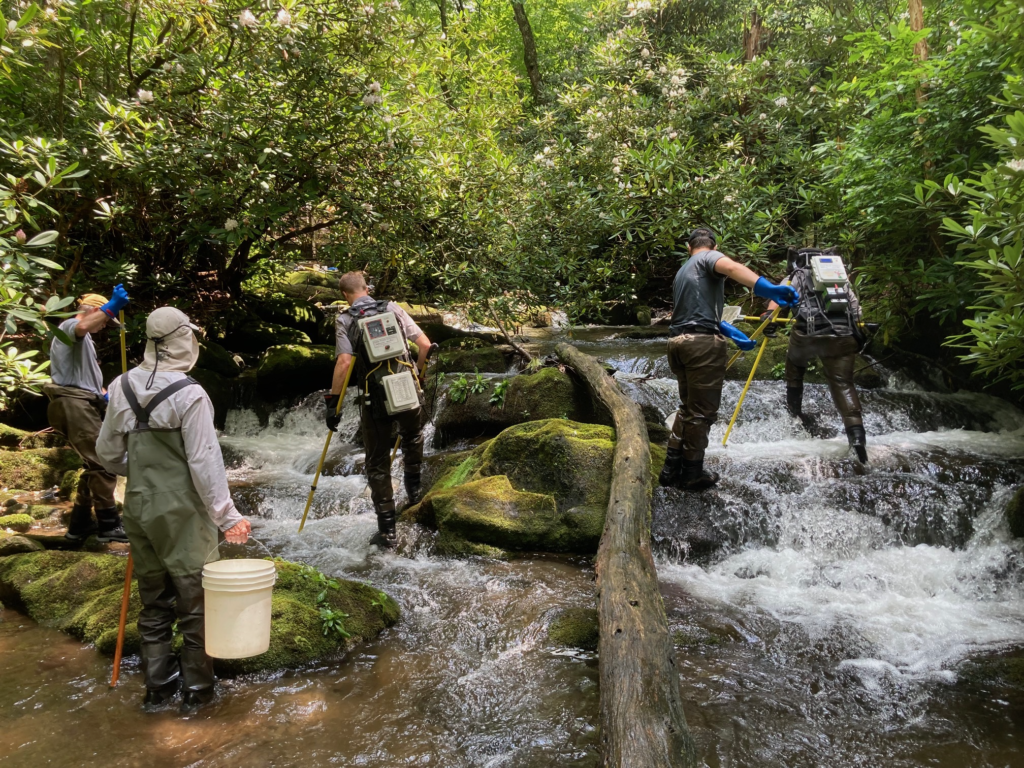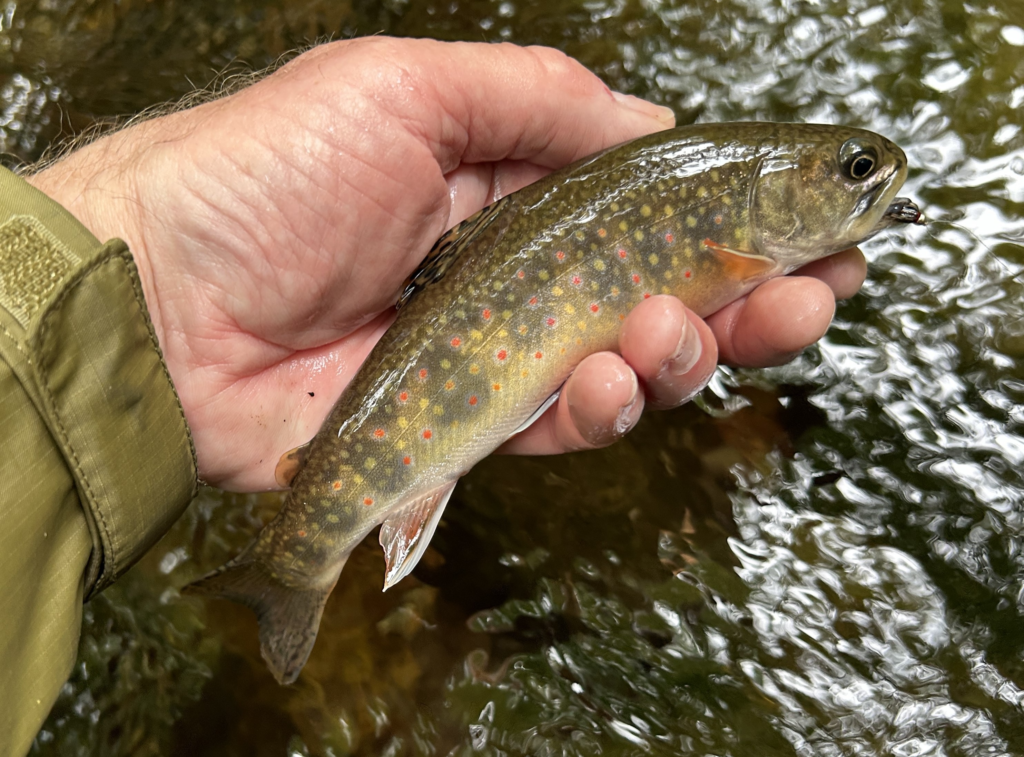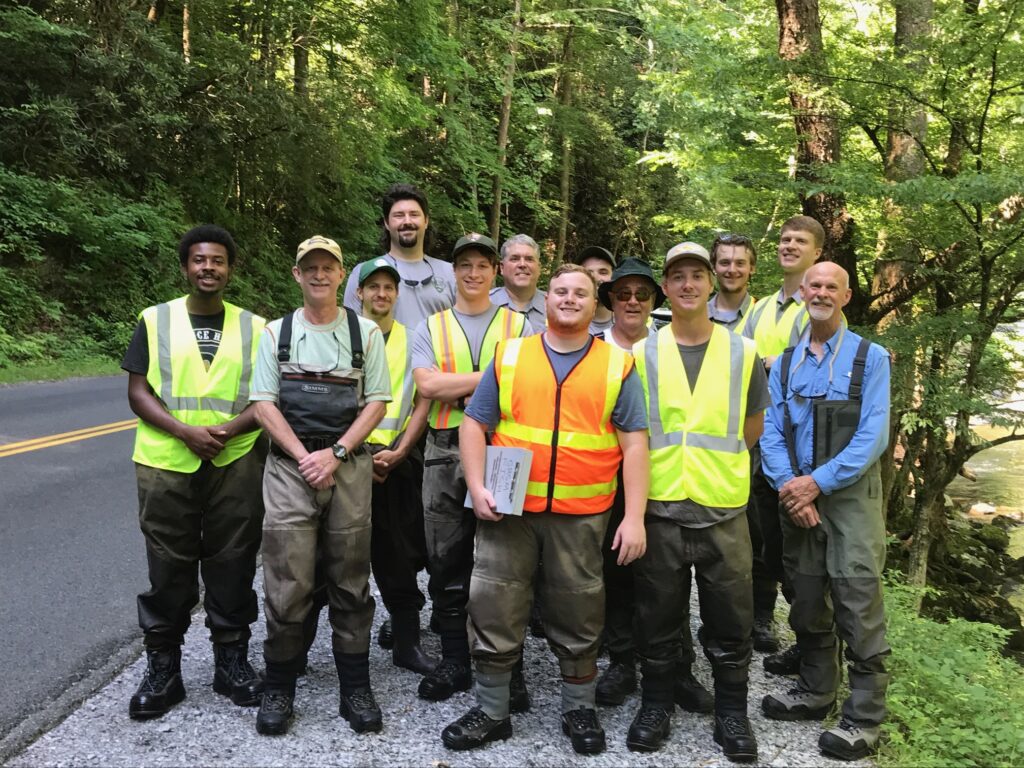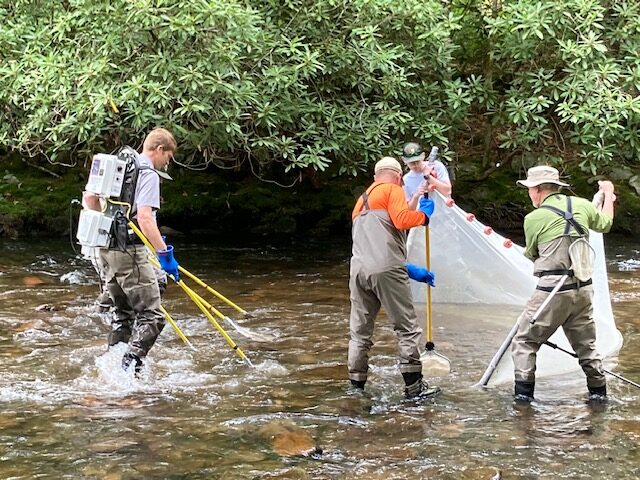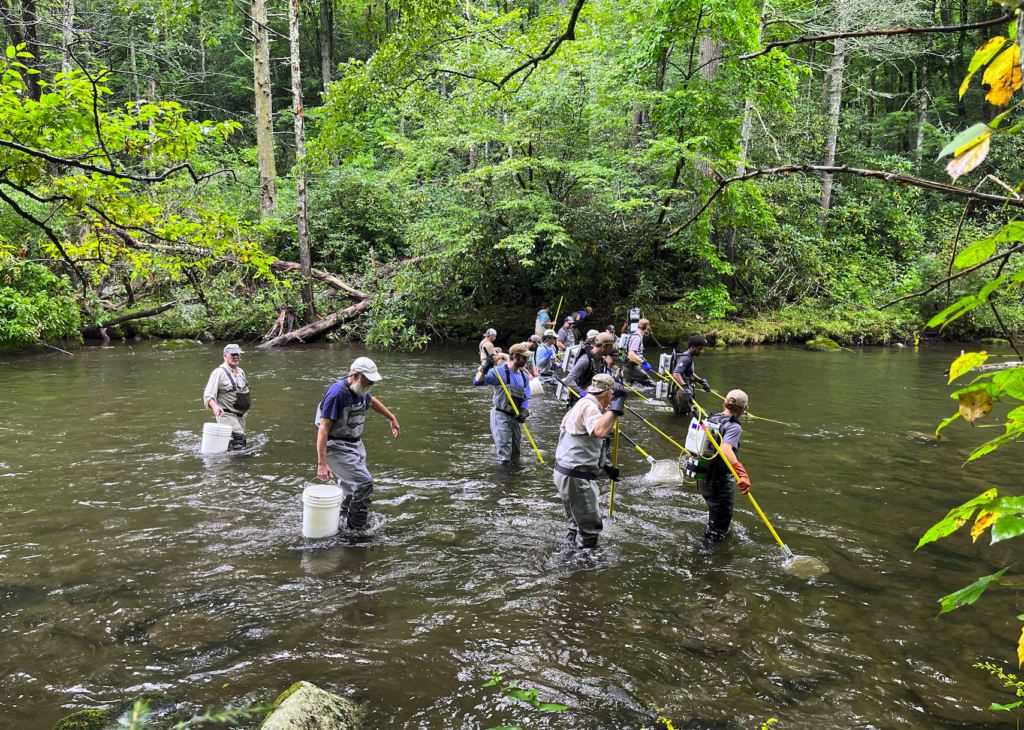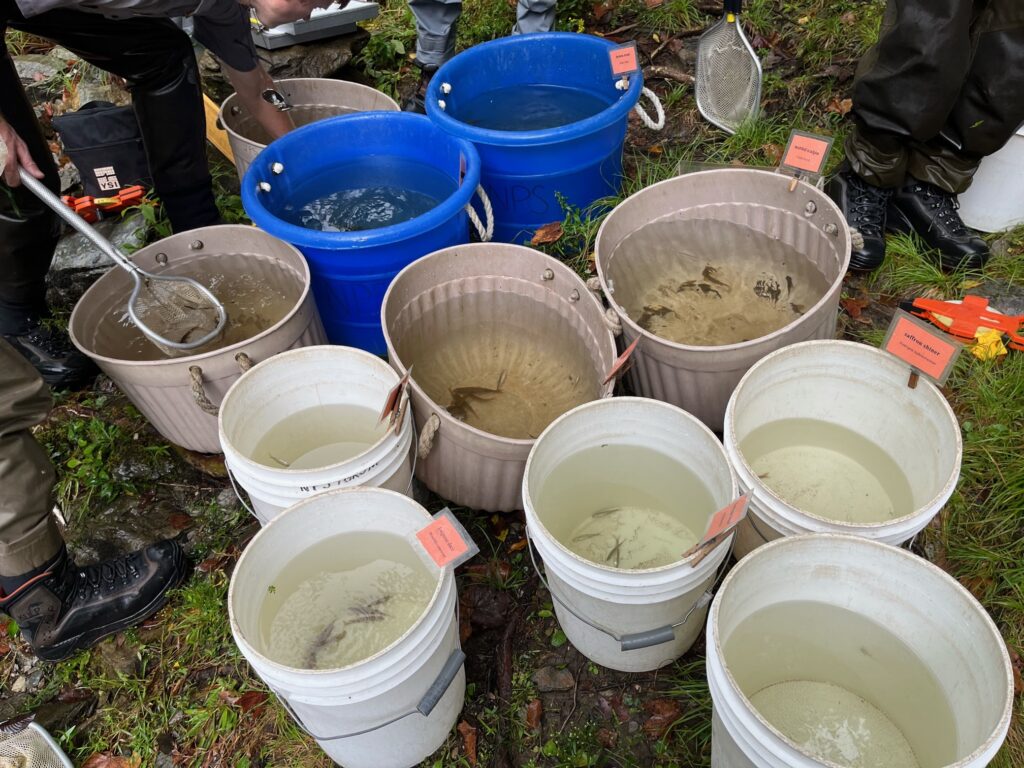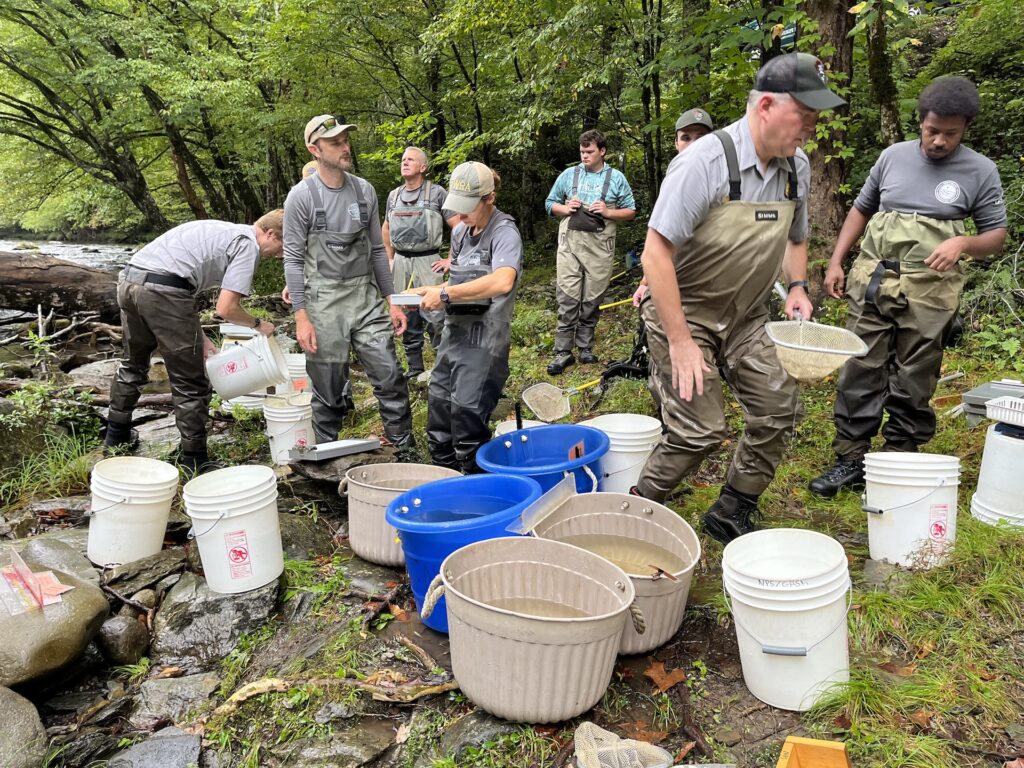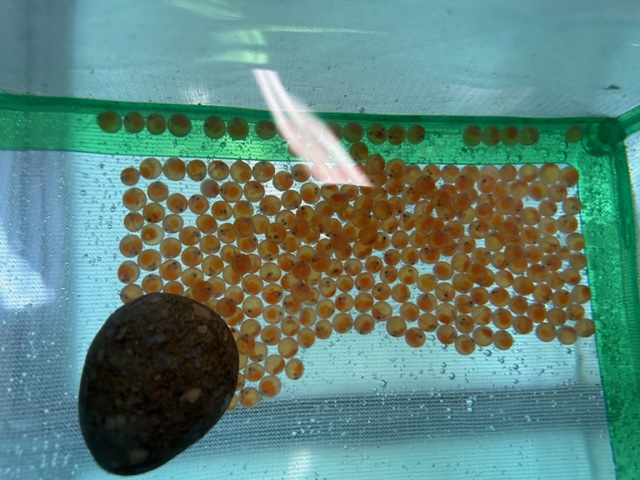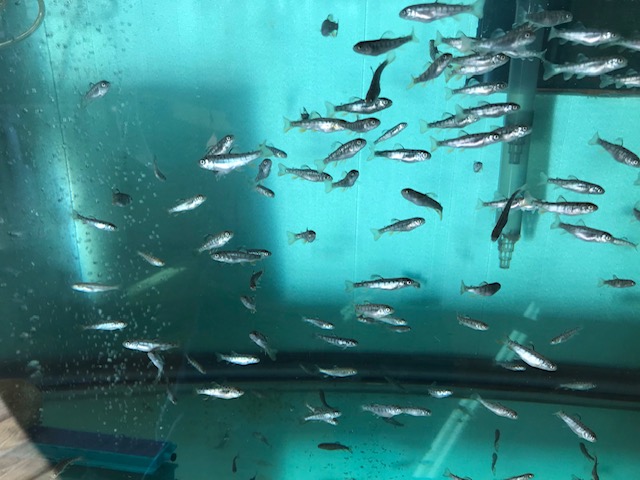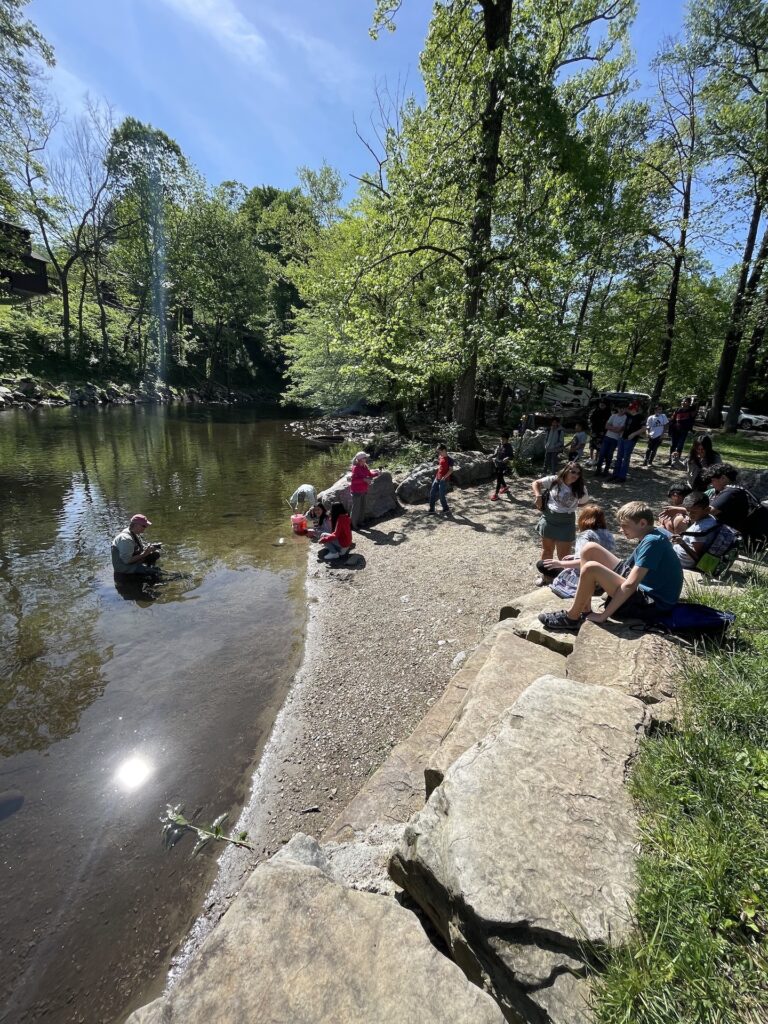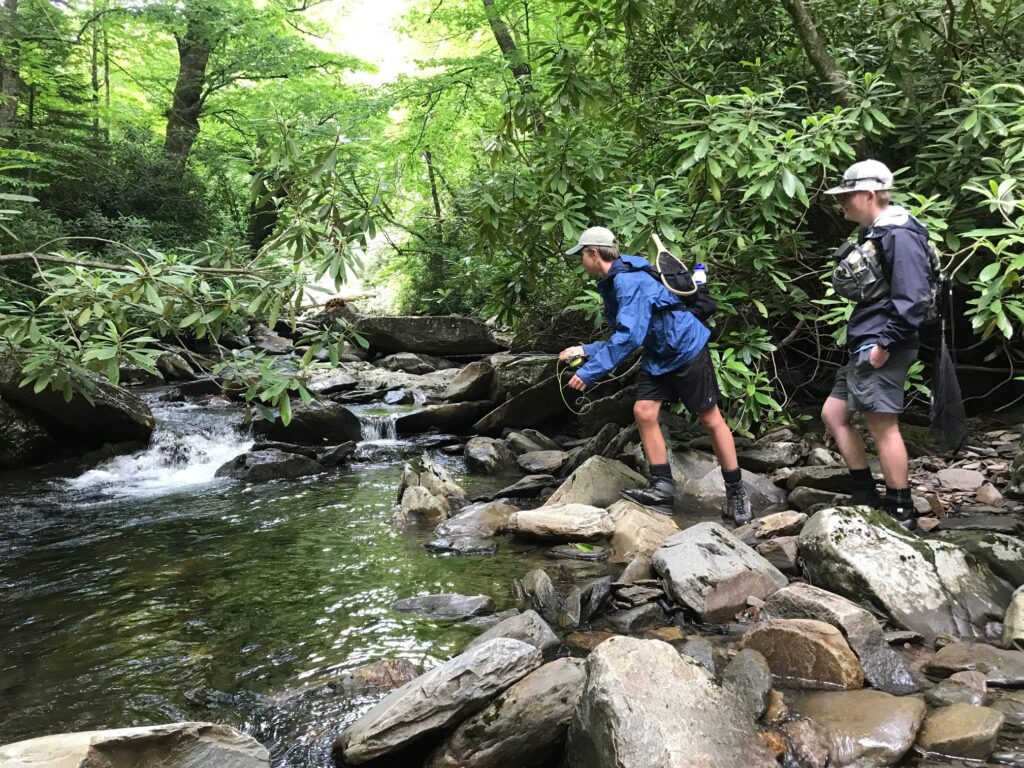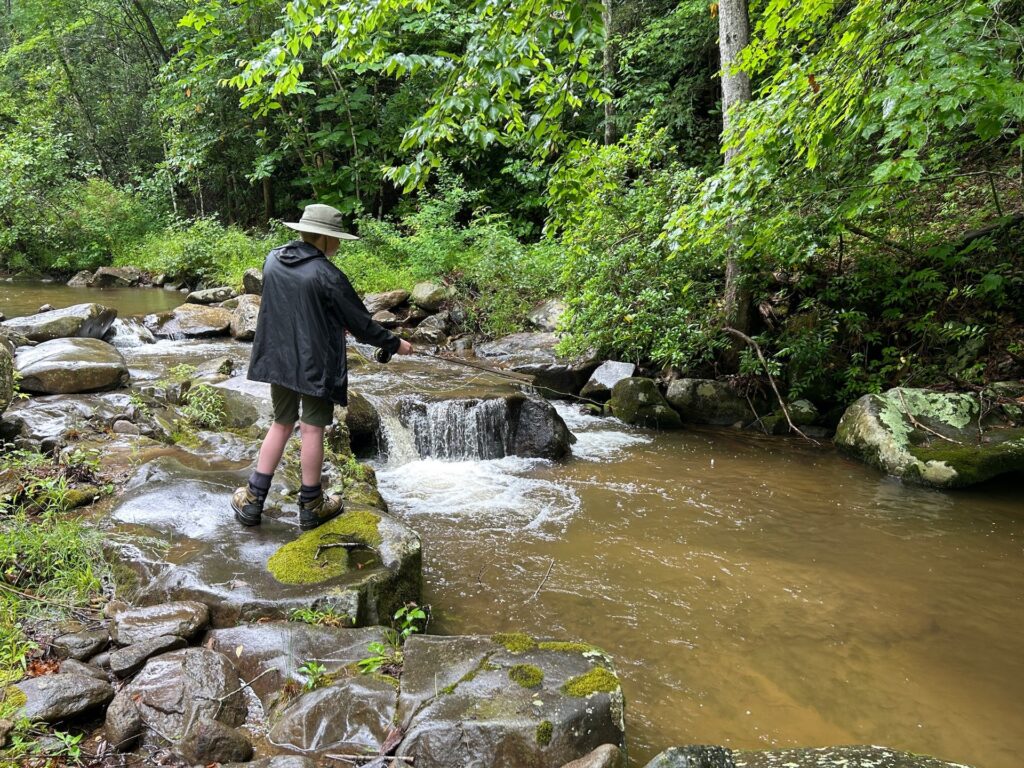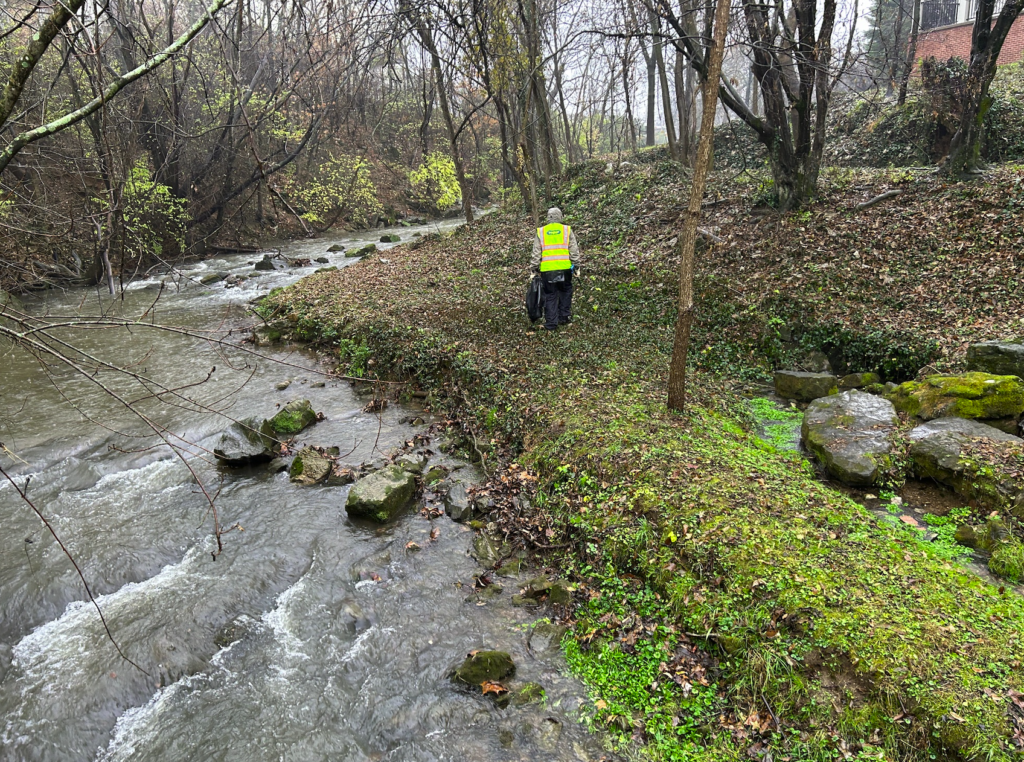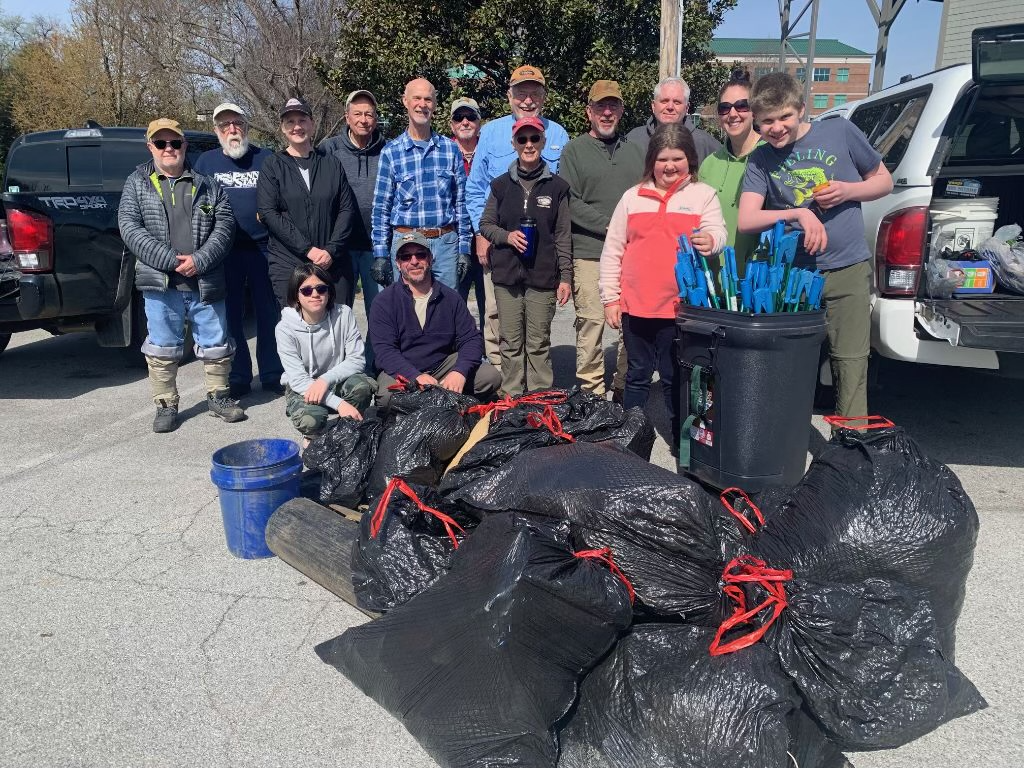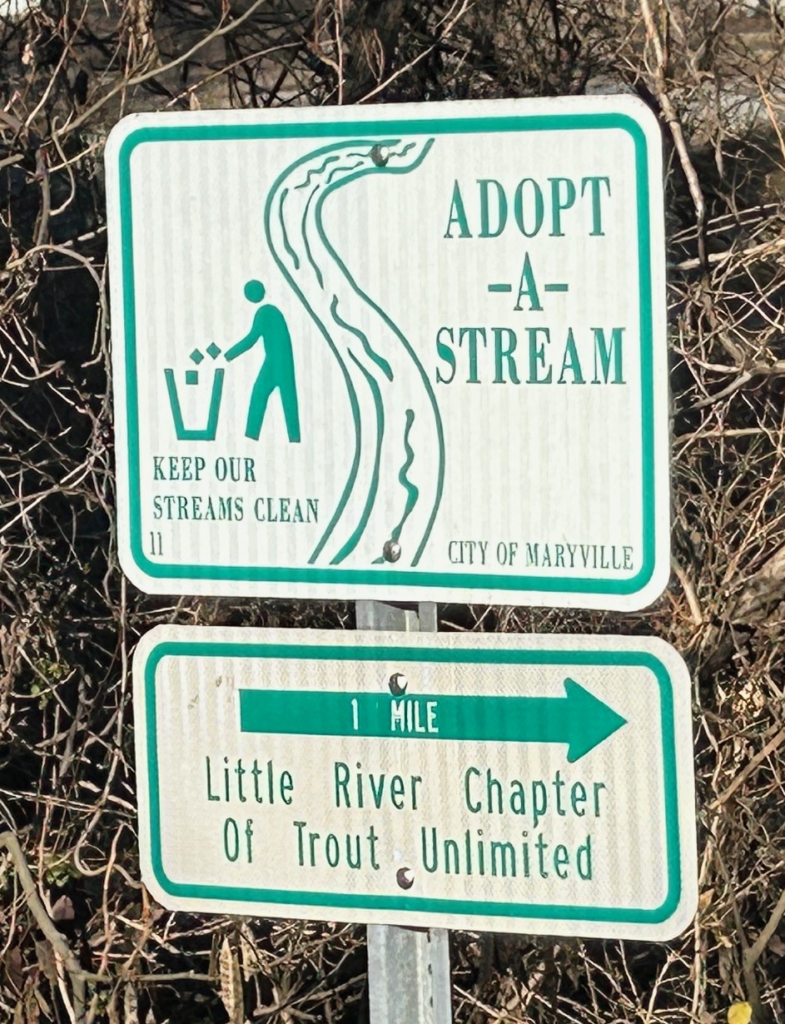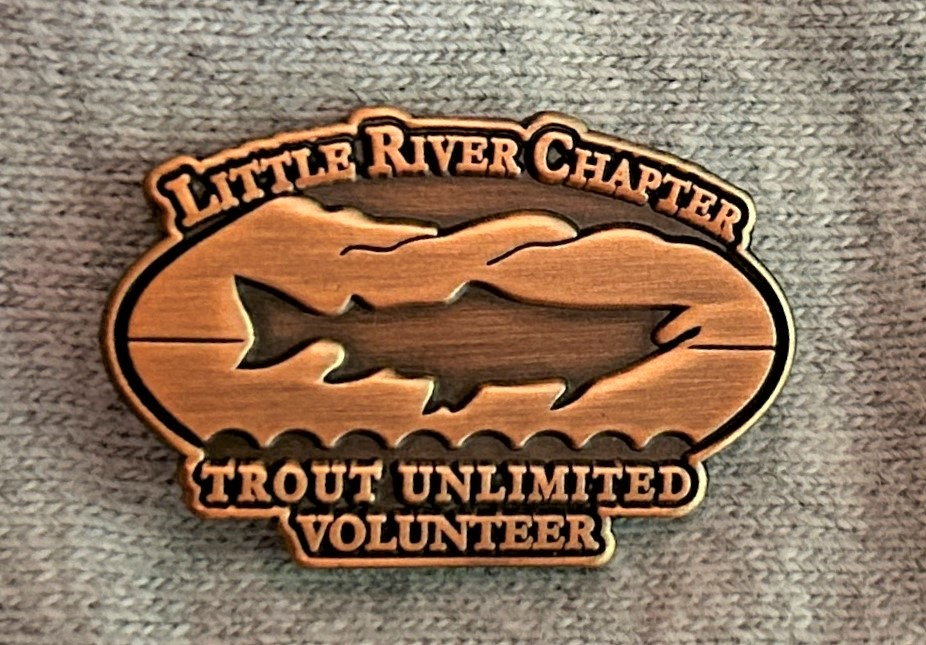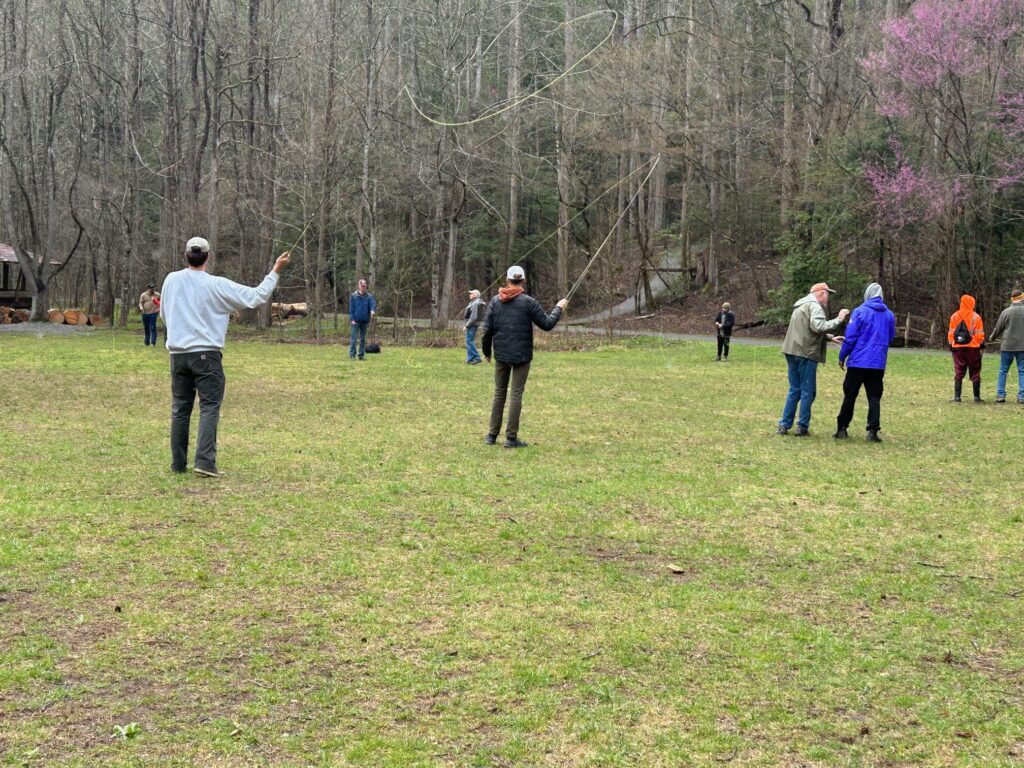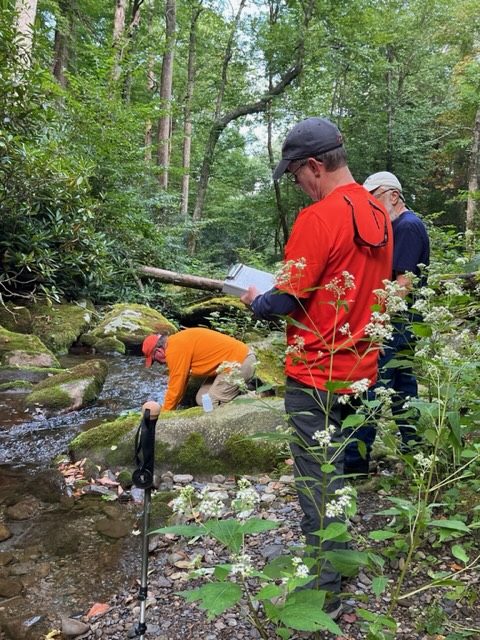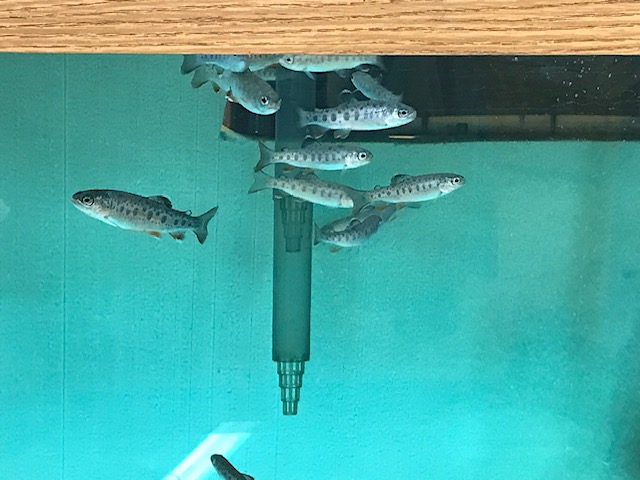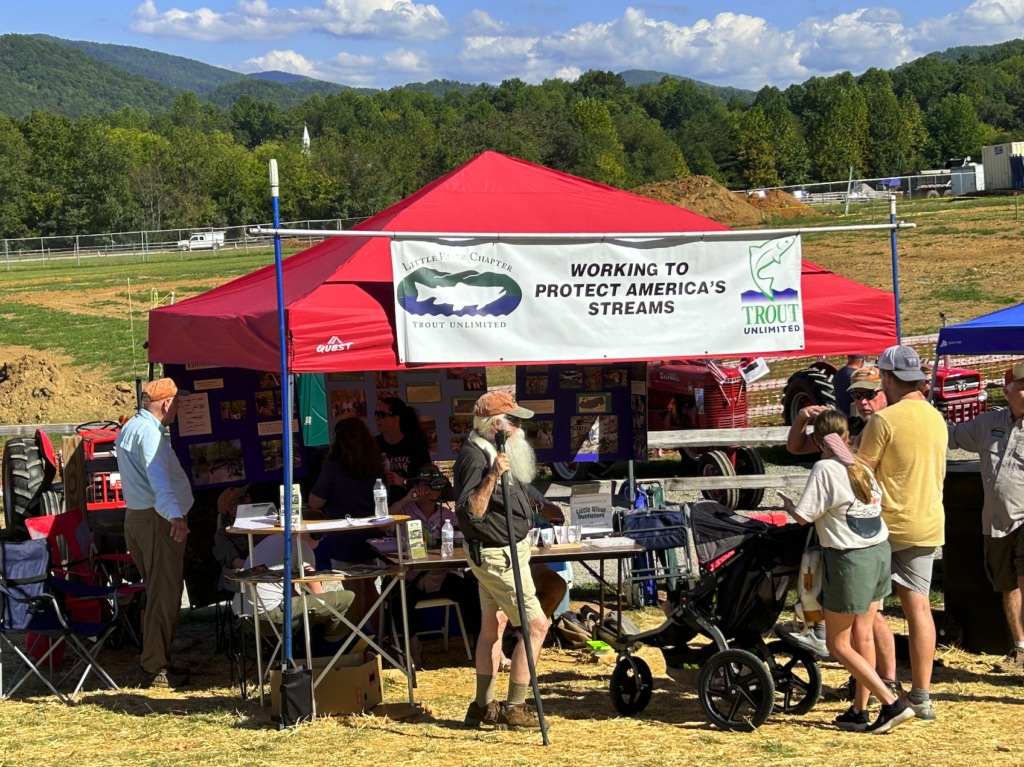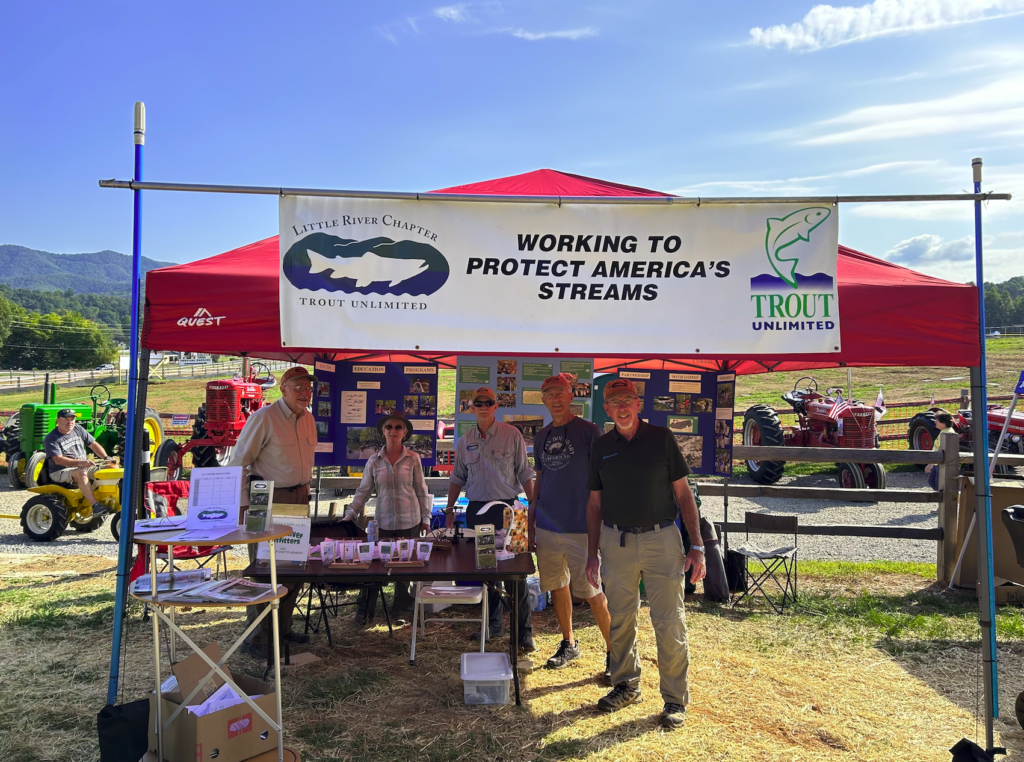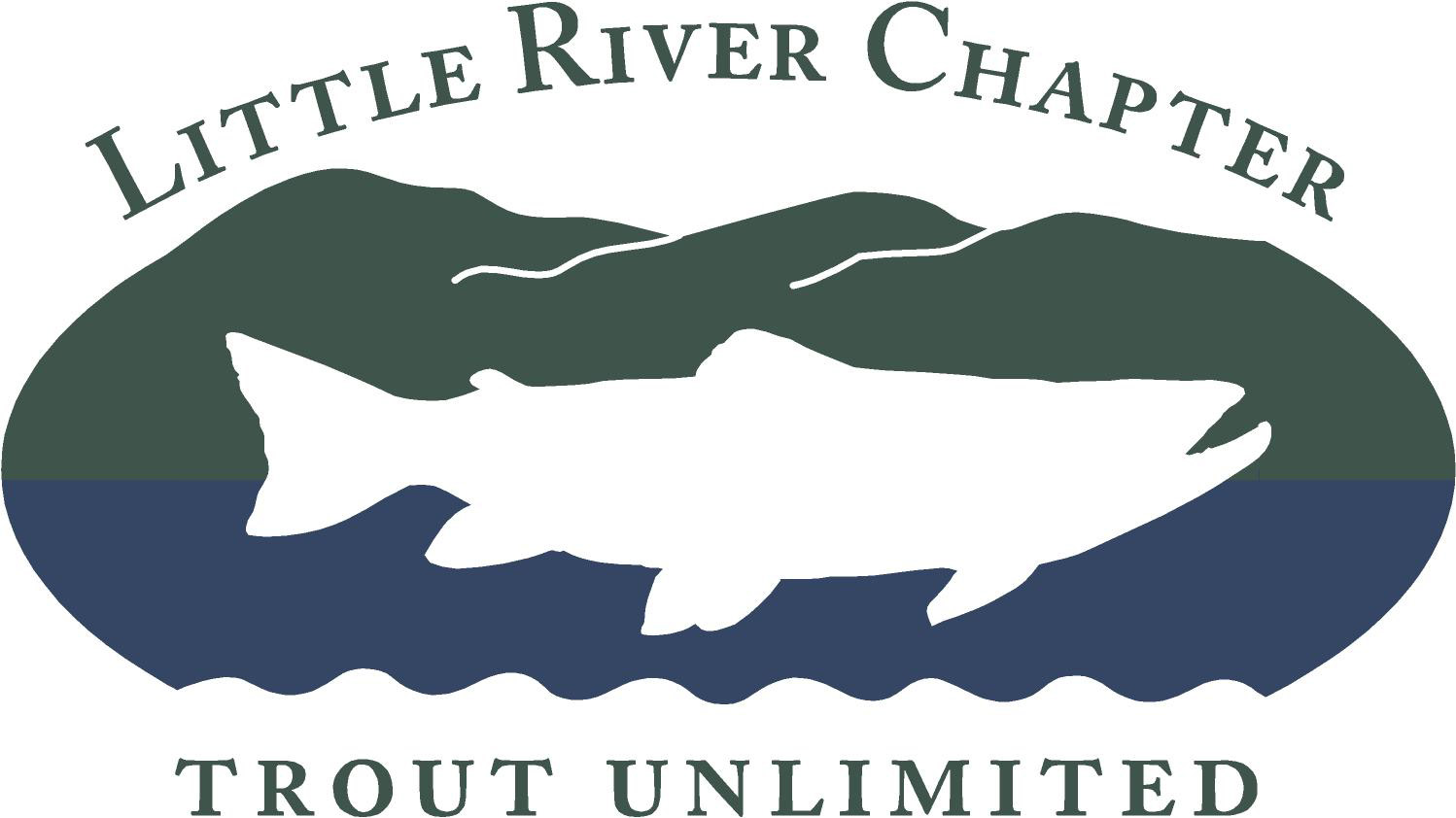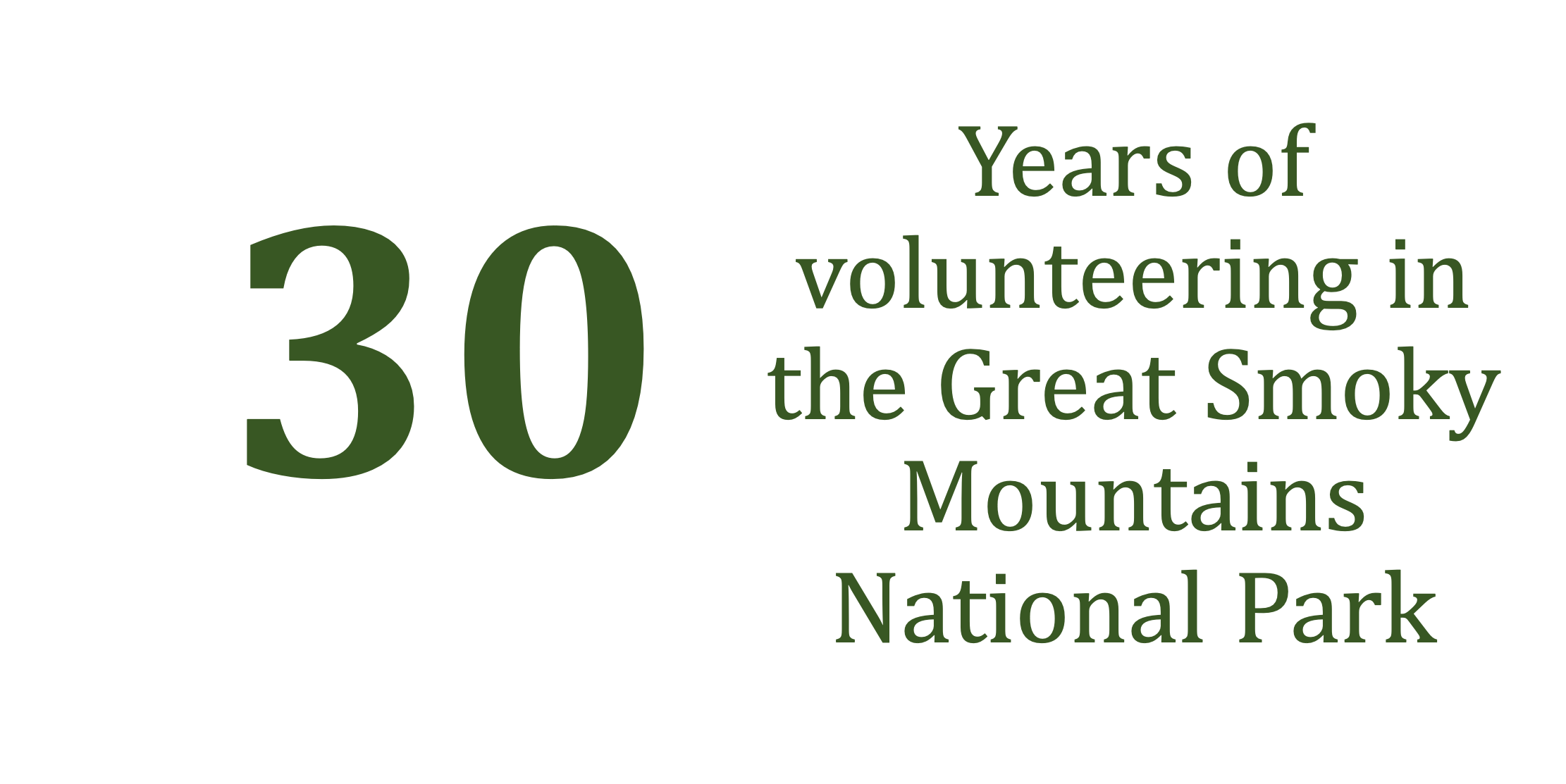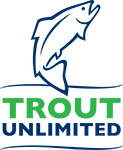Ongoing Chapter Activities and Opportunities to Volunteer
1. Monthly Chapter meetings
2. GSMNP stream barrier surveys
3. GSMNP acid deposition water sampling
4. GSMNP brook trout restoration and monitoring
5. GSMNP index of biotic integrity (IBI)
6. GSMNP 3-pass depletion stream surveys
7. GSMNP Little River clean-up
8. Monthly Tie and Lie fly tying meetings
9. Trout in the Classroom (TIC)
10. John Thurman Smoky Mountain Trout Adventure Camp
11. Pistol Creek clean-up
12. Community science and service projects
13. Annual auction fundraiser
14. Townsend Fall Festival
Monthly Chapter Meetings
The Little River Chapter meets monthly. Our meetings are generally on the fourth Thursday of each month, held in or around the Maryville area. Each summer we plan a picnic setting for the Chapter meeting and in November/December our meeting has typically revolved around our fundraising auction. Each meeting agenda typically includes a social hour and food to order starting at 6:00pm, guest speaker presentation starting at 7:00pm, followed by a brief business meeting of the Chapter’s activities. Members and guests are welcome to attend any and all portions of the agenda. Meeting announcements are distributed via our electronic monthly Chapter Newsletter to all members’ email addresses. Copies of past meeting presentation minutes are available here.
Ways to get involved:
– Check the meeting announcements in the monthly Chapter Newsletter
– If you are not receiving the newsletter, contact lrctu.newsletter@gmail.com to enroll.
GSMNP Stream Barrier Surveys
In 2022 LRCTU initiated this major project in support of the GSMNP. Stream Barrier Surveys are quantitative evaluations that determine the effect of stream barriers on Aquatic Organism Passage (AOP). AOP addresses the migratory needs of all organisms in the stream, including trout. The methodology ranks the severity of three types of stream barriers: culverts, bridges, and fords. Jeff Wright, the Southeast Regional representative from TU National provided the initial round of training for the project leaders from our Chapter. Since then six teams, with 12 volunteers have received formal training. However, NO training is required to volunteer to help on one of the teams. Phase I of the project which included over 100 high-priority site surveys on the Tennessee side of the Park is complete. This was a high priority for GSMNP and the TU Southeast Region. Future phases include hundreds of sites remaining to be surveyed within the Park, and many volunteers are welcome.
How to get involved: Contact Bernie Maloy, GSMNP Fisheries Tennessee Volunteer Coordinator at 52bazzman@gmail.com or (949)-212-8480.
GSMNP Acid Deposition Water Sampling
GSMNP Fisheries coordinates the routing collection of water samples on five reaches of streams in the Park. The levels of acid deposition in these streams have been recorded and researched for many years to evaluate the effects on water quality and subsequent impacts on aquatic organisms (including trout). These sampling activities are conducted six times per year, in the odd numbered months. Teams of 3 to 5 people are assigned to each of the five reaches. The hikes involved in each sampling route range from easy to difficult, giving volunteers the flexibility to sign up for a route that best suits their physical abilities. The amount of time for each sampling route also varies, ranging from 6 to 8 hours. Annually, the GSMNP Supervisory Fishery Biologist provides a summary report to LRCTU members on the results and trends revealed from the sampling.
Ways to volunteer:
– Contact Bernie Maloy, GSMNP Fisheries Tennessee Volunteer Coordinator at 52bazzman@gmail.com or (949)-212-8480, or
– Mike Kesselring, coordinator for the North Carolina side of the GSMNP, may be reached at mikessel59@gmail.com or (828) 736-6929.
GSMNP Brook Trout Restoration and Monitoring
Southern Appalachian brook trout were native to many streams in the GSMNP, but their population declined due to logging, over-harvesting, and acid deposition. The brook trout population also declined as they were competing with stocked rainbow and brown trout within the same reaches of streams. The GSMNP Fisheries Department has endeavored to restore native brook trout where feasible. An example stream is Anthony Creek (Upper Abrams Creek) where brook trout restoration efforts were implemented starting in 2015. NPS Fisheries, with LRCTU volunteers, surveyed this reach in early 2023. Other brook trout restorations have been carried out on Lynn Camp Prong and the Little Cataloochee. Each year the Park Fisheries Department invites volunteers from LRCTU to assist with scheduled restoration and monitoring activities.
Ways to volunteer:
– Contact Bernie Maloy, GSMNP Fisheries Tennessee Volunteer Coordinator at 52bazzman@gmail.com or (949)-212-8480, or
– Mike Kesselring, coordinator for the North Carolina side of the GSMNP, may be reached at mikessel59@gmail.com or 828-736-6929.
GSMNP Index of Biotic Integrity (IBI)
The Park Fisheries Department conducts stream studies to measure the Index of Biotic Integrity (IBI) each year. Selected streams are periodically scheduled to maintain a status of the health of each. The IBI technique involves electro-shocking a sample of four types of stream structures: riffles, runs, pools, and shoreline. For a given 100 meter stretch, three passes of each structure type are conducted, until no new species are identified. Park Fisheries staff identify and count each species by structure type. IBI studies are looking for all species of fish in the selected river or stream, not just trout. IBI stream study events typically require a half-day commitment for Chapter volunteers.
Ways to volunteer:
– Contact Bernie Maloy, GSMNP Fisheries Tennessee Volunteer Coordinator at 52bazzman@gmail.com or (949)-212-8480, or
– Mike Kesselring, coordinator for the North Carolina side of the GSMNP, may be reached at mikessel59@gmail.com or 828-736-6929.
GSMNP 3-Pass Depletion Stream Surveys
The techniques employed in 3-Pass Depletion Stream Surveys include a comprehensive survey of a 200 meter section of a specified stream or river. The Park Fisheries staff, assisted by our volunteers, conduct three passes with electro-shockers spanning the river from bank to bank, a comprehensive effort to collect almost all fish in the 200 meter stretch. The team captures, identifies, and quantifies all fish species collected. This effort requires a large crew, often as many as 24 people. The team involves a great mix of TU volunteers, NPS Fisheries staff, NPS seasonal workers, Fisheries interns, and TWRA. 3-Pass Depletion Stream Surveys generally require a full day commitment for Chapter volunteers.
Ways to volunteer:
– Contact Bernie Maloy, GSMNP Fisheries Tennessee Volunteer Coordinator at 52bazzman@gmail.com or (949)-212-8480, or.
– Mike Kesselring, coordinator for the North Carolina side of the GSMNP, may be reached at mikessel59@gmail.com or 828-736-6929.
GSMNP Little River Clean-up
Each year, typically in the fall, LRCTU supports the GSMNP with the Little River stream side clean-up. The litter clean-up crew assembles at the Metcalf Bottoms Picnic Area in the Park around 9 a.m. After a safety talk the crew splits into smaller teams to walk-down about four miles of Little River Road adjacent to the River. After a couple of hours of trash collection we meet back at Metcalf Bottoms for a great lunch. TVA has been a financial sponsor for LRCTU stream side cleanups in 2023.
Ways to volunteer:
– Contact Bernie Maloy, GSMNP Fisheries Tennessee Volunteer Coordinator at 52bazzman@gmail.com or (949)-212-8480, or
– Check the announcements in the monthly Chapter Newsletter for details.
– If you are not receiving the newsletter, contact lrctu.newsletter@gmail.com to enroll.
Monthly Tie and Lie – Fly Tying Meetings
Each month, usually the last Monday of the month, leaders of our Chapter invite everyone to share their fly tying expertise and/or learn how to tie a featured fly. No experience is necessary to get started. The Tie and Lie gathering is a social engagement as well as an educational experience. Meeting announcements are sent out electronically via our mailing list, same as the monthly newsletter.
Ways to get involved:
– If you plan to attend and need a vise or materials, contact Ernie Frey at 865-403-2832.
– If you are not receiving the newsletter, contact lrctu.newsletter@gmail.com to enroll.
Trout in the Classroom (TIC)
Trout in the Classroom (TIC) is a major effort of LRCTU. This program is endorsed by the TU National organization and funded by the TN Council of TU. LRCTU is engaged with 13 aquariums (fish tanks) in twelve local schools, with over 600 students involved. Students raise trout from eggs and release fry into local streams with oversight provided by LRCTU, GSMNP Fisheries, and TWRA. In December 2023, five schools conducted trout fry releases with 120 students participating stream side. This evolution occurs twice each year, once in the fall and again in the spring. TIC is a great way to volunteer to support the local schools and release events.
How to get involved: Contact Kim Emery, Director of Volunteer Operations, at kim@topshelfedu.com.
John Thurman Smoky Mountain Trout Camp Adventure
Each June the TN Council of TN sponsors the John Thurman Smoky Mountain Trout Adventure Camp (Trout Camp) at the Tremont Institute. Trout Camp is a one-week learning experience for approximately 18 selected youth participants. The curriculum includes fly tying, casting, fishing, environmental science, and camaraderie. Camp staff members come from across the TN Council region. The dedication of the camp staff is essential to its popularity. Each member volunteers their time to make this happen, and LRCTU volunteers are essential to its success since it is essentially in our backyard.
How to get involved: Contact Bob Bishop at bishmoose@sbcglobal.net.
Pistol Creek Clean-up
LRCTU keeps a semiannual commitment to the City of Maryville to do a cleanup of “our” mile of Pistol Creek from the Rt. 321 Bridge to the pond dams. Our commitment is coordinated with semiannual trout stocking by the TWRA, with clean-ups typically scheduled for April and December. The Little River Chapter partners with the Keep Blount Beautiful and Little River Watershed Association non-profits to enlarge the number of people participating and cleanup more of our mile. TVA has been a financial sponsor for LRCTU stream side cleanups in 2023. The cleanup starts at 9:00 a.m. when we meet in the Old Blount County Courthouse parking lot in downtown Maryville. Large garbage bags, gloves and trash grabbers are provided. Volunteers should wear clothes and shoes you are willing get dirty. If you wish you can wear waders and wader boots to get a ‘closer’ stream experience.
Ways to volunteer:
– Check the announcements in the monthly Chapter Newsletter for details.
– If you are not receiving the newsletter, contact lrctu.newsletter@gmail.com to enroll.
– Contact Ernie Frey at 865-403-2832 if you have any questions.
Community Science and Service Projects
LRCTU is often requested to speak and / or convey our mission in a variety of community venues. Examples include fly tying events at the Blount County Library, fly-casting demonstrations/lessons available to the community, presentations for students of Maryville College, presentation / demonstration for students of Clayton Bradley Academy, and supporting field trips for local students on streams within the GSMNP. These events emerge upon the request of interested community agencies, and LRCTU volunteers are needed to support them on an as-needed basis.
How to get involved: Contact Bob Bishop at bishmoose@sbcglobal.net.
Annual Auction Fundraiser
This event is our annual on-line auction scheduled late November to early December. Proceeds from the auction support the GSMNP Fisheries Department. Planning and supporting this event is a significant effort. Work for this fundraiser starts in August and wraps up in December. Many volunteers are needed from planning throughout implementation and delivery.
Ways to volunteer:
– Contact Harry Fetterman at hefetterman@gmail.com or Bob Bishop at bishmoose@sbcglobal.net.
– Check the announcements in the monthly Chapter Newsletter for details.
– If you are not receiving the newsletter, contact lrctu.newsletter@gmail.com to enroll.
Townsend Fall Festival
LRCTU was selected as an exhibitor for the September 2023 Townsend Fall Festival. LRCTU focused on the legacy of fly fishing in the Smokies and the importance of conserving our coldwater resources in and around GSMNP, preserving this fishery for future generations. Many LRCTU volunteers participated with set-up, fly tying demonstrations, fly-casting demonstration and coaching, and speaking with visitors about our Mission and Activities. LRCTU plans to continue and enhance this community outreach event for future years.
How to get involved: Contact Bob Bishop at bishmoose@sbcglobal.net.

